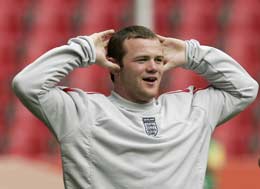Financial problems facing British soccer clubs are putting increased scrutiny on the enormous sums paid to top players.
Many English Premier League clubs lost money last year on top of mounting debts, and two British clubs were forced into administration last month -- Scottish champions Rangers and English championship (second division) team Portsmouth.
 Yet wages paid by Premier League clubs grew faster than their revenue for the last two years, and now make up an all-time high of 68 percent of club earnings, according to business services group Deloitte.
Yet wages paid by Premier League clubs grew faster than their revenue for the last two years, and now make up an all-time high of 68 percent of club earnings, according to business services group Deloitte.
Britons are facing years of austerity and rising unemployment, fuelling a popular backlash over the levels of pay for senior bankers. Now footballers are stretching the loyalty of supporters.
"For people like me working in the public sector under a pay freeze, it's a kick in the teeth," Arsenal fan Paul Coleman, 24, told Reuters, speaking minutes after his club won a thrilling victory over north London rivals, Tottenham Hotspur.
The average pay earned by Premier League players is 25,000 pounds a week, the rough equivalent of what an average British worker earns in a year.
"When transfer time comes round and you hear about players wanting to leave because they're not being paid enough, but they're on 100 grand (thousand) a week," fellow fan Chris Walsh said.
"You could buy a house each week. It just makes you sick."
Both hold Arsenal season tickets which went up in price by 6.5 percent last year.
Soccer administrators -- like their counterparts in the City of London financial district -- stress that clubs have to compete with big European rivals in the wage stakes.
"No football club is out there paying unnecessarily high wages. They pay the least amount they can to get the best possible players," said English Premier League spokesman Dan Johnson.
Restraint is not helped by evidence that sporting success comes at a price. According to Deloitte figures, there is a strong link between how much a club spends on wages and how high it ranks in the Premier League.
New Financial Fair Play from European soccer's ruling body UEFA aim to break that connection.
The rules, coming into full force in 2013, oblige clubs to stop posting repeated losses and settle their debts on time "to protect the long-term viability of European club football."
Wealthy foreign owners have pumped hundreds of millions into some clubs, allowing them to buy players at uncapped cost and bidding up wages.
Players across Europe have also cashed in after the 1995 Bosman ruling which allowed them to move clubs for free when their contracts expire. Teams responded by offering top players longer and more lucrative contracts to ensure that they retained their prize assets.
But the industry is under increasing pressure to change.
Everton manager David Moyes this week called for everyone in the Premier League to take a 20 percent pay cut, to make the game more affordable for fans.
Top players for stricken Scottish champions Rangers have been asked to take pay cuts to avoid enforced redundancies.
Deborah Hargreaves, the chair of the High Pay Commission inquiry into top private sector pay and wage inequality in Britain, told Reuters footballer pay is the next target of her think-tank, the High Pay Centre.
"We do want to look at football because we want to look to public attitudes to pay," she said. "People don't seem to have such visceral objections to it as to top bosses."
Arsenal season ticket holder Chris Walsh, 23, said clubs risked alienating supporters unless they got footballer pay under control.
"The player wages have gradually taken the passion out of the game, because instead of playing for the shirt, they're playing for the pound."











 © 2025
© 2025